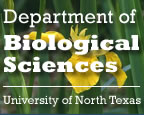MS in Biology
Graduate Degrees in Biology
The biology program provides students the option of selecting a research track leading to the Master of Science (MS) or Doctor of Philosophy (PhD) in biology, or a non-research track leading to the Master of Arts (MA) in biology. Students interested in obtaining both a masters degree and certification to teach life sciences at the secondary level may select the non-research Master of Science in Biology: Teaching in the Life Sciences. Students pursuing a research degree have the opportunity to conduct research leading to a thesis or dissertation in a variety of specializations, including aquatic biology, aquatic toxicology, ecology, forensic biology, genetics, immunology, limnology, microbiology, neurobiology, physiology and plant biology. Visit www.biol.unt.edu for research interests of the faculty. Information on degree requirements follows the program descriptions.
Degree Programs
Master of Science (MS) in Biology
A 30-hour research degree that requires 24 hours of formal course work, special problems and seminars at the 5000 and 6000 levels, plus a 6-hour thesis.
Master of Science (MS) in Biology: Teaching in the Life Sciences
A 36-hour non-thesis degree for students who have a BA or BS in a life science and wish initial teacher certification for teaching the life sciences at the secondary level. The degree requires 18 hours in biology (BIOL 5260, 5830 and 6150, plus 9 elective graduate hours in biology) and 18 hours in secondary education (EDSE 5002, 5004, 5105, 5115, 5130 and 5470). Admission to secondary education courses requires the student to meet all College of Education requirements. Students completing this non-thesis MS are not eligible for the PhD program in the Department of Biological Sciences.
